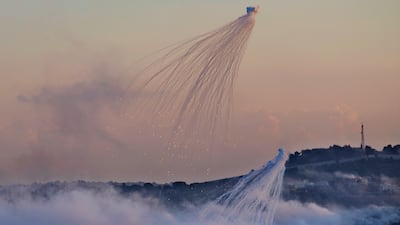Reports this week of white phosphorus – a particularly dangerous and nasty substance – allegedly being used against targets in southern Lebanon by Israeli forces are alarming. Although the substance’s use in warfare is deemed permissible under international law, albeit with conditions, white phosphorus has an array of short and long-term effects for which Lebanese border communities will pay a heavy price, possibly for years to come. The legality of something does not always speak to its morality.
“Ecocide” was the word used by Hisham Younes, the head of a Lebanese environmental NGO. Speaking to The National on Tuesday he said that “Israel's deliberate bombardment of woodlands, olive groves and fruit tree orchards, particularly citrus, has led to significant environmental damage”.
Lebanon’s Ministry of Agriculture echoed Mr Younes’s claims. It said that since October 8, 328 fires were recorded in 52 towns in the area owing to Israeli shelling. Of the affected areas, the ministry said, 60 per cent is woodland, 25 per cent is agricultural land, and 15 per cent is fruit and olive trees. About 45,000 trees in total have been burnt and livestock have also been affected.
The fires are primarily attributed to the use of white phosphorus – and it is not the first time that Israel has been accused of using the toxic substance. Last month, two major international NGOs accused Israeli forces of firing shells containing white phosphorus into Gaza and Lebanon. Israeli military spokesman Lt Col Peter Lerner later told CNN that “categorically, no," Israel had not used the agent in its operations.
Israel has also denied the more recent allegations, telling The National that there “are visual similarities between smokescreen shells that contain white phosphorus and those that do not”.
White phosphorus exists in something of a legal grey area. Although it is not illegal to use it for specific military tasks – such as illuminating a battlefield – its devastating effects on those directly exposed to it meant that international law forbids its use where there is a “concentration of civilians”. According to the World Health Organisation white phosphorus – which ignites instantly upon contact with oxygen and sticks to skin and clothes – can “cause deep and severe burns, penetrating even through bone, and has been known to reignite after initial treatment”. The WHO also says that the smoke from burning phosphorus is “harmful to the eyes and respiratory tract”.
But it is when white phosphorus gets into the environment that its deadly effects become less apparent, although no less dangerous. According to the US Centres for Disease Control and Prevention, white phosphorus can degrade in low-oxygen water to a highly toxic compound called phosphine. Contaminated lakes and streams can contain fish with build-ups of white phosphorus, and in deep soil or sediments with little oxygen, white phosphorus may remain unchanged for years.
In Lebanon, human rights groups and the government have accused Israel of using chemical substances to cause long-term damage to the environment. The use of such a lingering, dangerous substance in this war has a worryingly punitive character. Long after the fighting ends, civilian communities in Lebanon could face the risk of serious ill-health caused by white phosphorus and its degrading ingredients. This is nothing to say of the economic hardships caused by burnt farmland and poisoned animals.
For some, this fits in with previous behaviour from Israel’s armed forces, in which the goal seems to have been inflicting punitive damage over strategic gains. In its conflict with Hezbollah in 2006, Israel used 90 per cent of its cluster munitions in the conflict’s final 72 hours, shortly before a ceasefire was to take effect.
In addition to its immediate violence and destruction, war brings serious environmental ruin as well. Even so-called conventional wars post serious threat to the environment; a 2019 report from Brown University’s Watson Institute of International and Public Affairs found that the use of military vehicles and heavy weaponry in war zones produced hundreds of thousands of tonnes of air pollution.
Using a weapon such as white phosphorus that can cause major burns and injuries, scorch orchards, sicken livestock and poison the soil for years is highly questionable. As a way of seeding resentment and grievance for decades to come, white phosphorous is as effective as it gets. The question must be for those in authority: is it worth it?
















